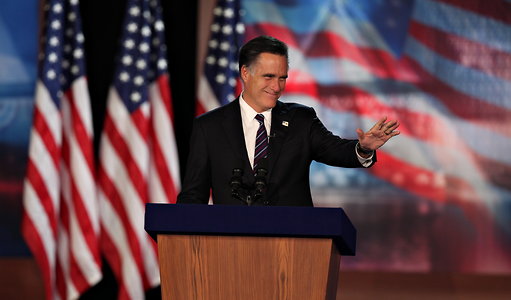Mitt Romney’s loss to a Democratic president wounded by a weak economy is certain to spur an internecine struggle over the future of the Republican Party, but the strength of the party’s conservatives in Congress and the rightward tilt of the next generation of party leaders could limit any course correction.
With their party on the verge of losing the popular presidential vote for the fifth time in six elections, Republicans across the political spectrum anticipate a prolonged and probably divisive period of self-examination.
The coming debate will be centered on whether the party should keep pursuing the antigovernment focus that grew out of resistance to the health care law and won them the House in 2010, or whether it should focus on a strategy that recognizes the demographic tide running strongly against it.
“There will be some kind of war,” predicted Mike Murphy, a longtime Republican Party consultant, suggesting it would pit “mathematicians” like him, who argue that the party cannot keep surrendering the votes of Hispanics, blacks, younger voters and college-educated women, against the party purists, or “priests,” as he puts it, who believe that basic conservative principles can ultimately triumph without much deviation.
“We are in a situation where the Democrats are getting a massive amount of votes for free,” Mr. Murphy said.
But the debate will not just be about demographics. Ralph Reed, a veteran of the conservative movement, said that Mr. Romney’s loss would stir resentment among those who believe the party made a mistake in nominating a more centrist Republican who had to work to appeal to the party’s base.
“There’s definitely a feeling that it would be better to nominate a conservative of long-standing conviction,” he said.
As a party, Republicans continue to depend heavily on older working-class white voters in rural and suburban America — a shrinking percentage of the overall electorate — while Democrats rack up huge majorities among urban voters including blacks, Hispanics and other minorities. Not to mention younger Americans who are inclined to get their political news from Comedy Central and will not necessarily become more conservative as they age. The disparity means that Democrats can get well under 50 percent of the white vote and still win the presidency, a split that is only going to widen in the future.
According to exit polls, about 7 in 10 Hispanics said they were voting for Mr. Obama. Mr. Romney won the support of nearly 6 in 10 whites. In urban areas, white voters were split over the two candidates, but about 6 in 10 white voters in the suburbs went for Mr. Romney, as did nearly two-thirds in rural areas.
Mr. Romney won a majority of voters 65 or older, while Mr. Obama was backed by 6 in 10 Americans under 30, and won a narrow majority of those under 44.
Even as they absorbed Mr. Romney’s defeat, the party’s top elected officials, strategists and activists said they believed that Republicans had offered a persuasive message of economic opportunism and fiscal restraint. While the messenger may have been flawed, they argued, Republicans should not stray from that approach in a moment of panic.
“The party has to continually ask ourselves, what do we represent?” said Senator Marco Rubio, the Florida Republican seen as a top White House contender in 2016. “But we have to remain the movement on behalf of upward mobility, the party people identify with their hopes and dreams. People want to have a chance.”
Meantime, my blog neighbor (and Democratic representative from Oklahoma) Rebecca Hamilton doesn’t mince words:
Republicans could easily have taken the White House this year. But they didn’t.
Why?
Their candidate sucked. Their campaign sucked worse than their candidate.
Find out why. She makes some good points. Read it all.
















